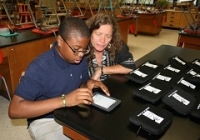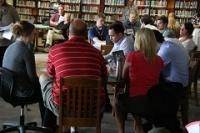DigiBridge
Grand Rapids Public Library, Mich.
Innovation Synopsis
Challenge/Opportunity
During a visit to Harrison Park School, the youth librarian ask the assembly of 7th and 8th graders how many of them had used an eReader. One student raised his hand. In that moment, it became clear that Grand Rapids Public School students were facing a technology gap that their suburban counterparts were not. Further research showed that many GRPS students were not using the public library due to barriers such as fines on their library card, transportation issues, and lack of parental interest. Both students and educators knew little of the library's digital resources and how to use them. Staff from the library and the schools began to meet on a regular basis, and a long-term formal partnership was developed between the two entities. With a strong commitment from the library director and the assistant superintendent, the DigiBridge initiative includes five areas of engagement: digital library cards; full access GRPL library cards; research database training; Nook eReader project; and a summer Teen [Tech]Knowledgy Camp. The library sought funding for the project from the Grand Rapids Public Library Foundation and the Friends of the Library. With funding in place, DigiBridge was presented to the school board for approval and was officially launched in the Fall 2013.
Key Elements of Innovation
The first step in the process was to break down barriers that students had using the library. The library's IT department created a program that allowed GRPS ids to be used as digital library cards to access the library's online resources. A portal, GRPS Connect, was created on the library's website. This portal curates databases based on audience (grade level, ESL, parent, educator) and subject. For students with a GRPL card, their fines were waived so they could use the library again. Library staff attended school orientation sessions to sign up attendees for full library cards and to provide information about the library, including the Ride to Read program, which provides bus passes to families to visit the library. Once school began, youth librarians trained teachers, paraprofessionals, students and parents on how to use the library's research databases. One of the most important elements of DigiBridge is to put technology in the hands of the students. 200 eReaders were purchased and four middle school classrooms were selected to pilot the eReader project. The eReaders were preloaded with grade appropriate books. Classes read "A Long Walk to Water" by Linda Sue Park and used their eReader to create book trailers about the story. The trailers were shown at a special event at the library for the students and their parents. In summer 2013, a Teen [Tech]Knowledgy Camp was held at GRPL for middle school students. Attendees received a eReader to use for the summer and used library resources to learn about technology and its real world applications. The camp culminated in students making robots. A full version of the camp will take place in summer 2014.
Achieved Outcomes
A six-month evaluation of the program was conducted. It was found that with minimal effort between our IT departments, all 17,000 GRPS IDs became digital library cards and can be used to access research databases from the Grand Rapids Public Library’s GRPS Connect research portal. GRPS students and teachers research online 24/7 and retrieve scholarly materials for their school reports and research projects. An intensive program to encourage all students to have a GRPL library card has resulted in 250 new cards and fine forgiveness of $5,700 for students to reactivate current cards. The last six months has brought a 9% increase in cards to patrons under 20 years of age. Library staff have trained 854 teachers, students, and parents on targeted research databases funded by the Michigan eLibrary and GRPL to become familiar at retrieving scholarly and peer reviewed articles. To date students have logged 3,800 research sessions. An advanced research curriculum is currently being developed. Nearly 100 students, teachers, and parents joined library staff at the Nook Festival in January. Students from classes using the e-readers discussed the books they read in common and presented projects and book trailers demonstrating their deeper understanding of each story’s themes and issues. A revamped Teen [Tech]Kowledgey Camp for summer 2014 is planned. While favorite learning activities such as exploring research databases and filming book trailers for an e-book students will read in common remain part of the curriculum, we’re adding a science lesson, linking the camps to GRPL’s Summer Reading Challenge.


